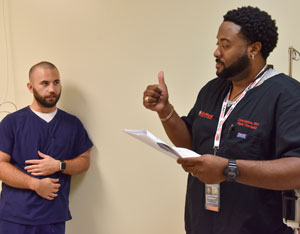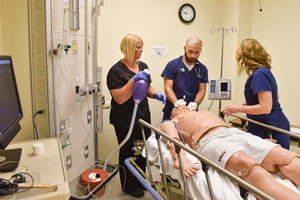 Simulation is an opportunity to practice critical thinking skills in real-world situations. Access to simulation labs and instructors trained in simulation is an important learning tool for faculty and students at the University of Alabama at Birmingham School of Nursing.
Simulation is an opportunity to practice critical thinking skills in real-world situations. Access to simulation labs and instructors trained in simulation is an important learning tool for faculty and students at the University of Alabama at Birmingham School of Nursing.
On top of that, these labs are also a way to prepare nurses and other health care providers throughout the community.
Through a contract for professional development, the School has partnered with AirMed International, a Birmingham-based air medical transport company, to allow access not only to the simulation labs, but also equipment and staff that can help facilitate real-world scenarios. Alumna Denise M. Treadwell, CRNP, MSN, CEN, CFRN, CMTE, a 1995 MSN and 1990 BSN alumna, is also the president of the company.
“Our willingness to partner with different community agencies is about preparing and continuing to train healthcare professionals,” said Tracie White, DNP, CRNP, ACNP-BC, CNOR, CRNFA. “These partnerships keep our nurses, respiratory therapists and all healthcare providers up to speed.”
The partnership has expanded learning opportunities, said AirMed Flight Respiratory Therapist Chris Mathis, BS, RRT-ACCS, who conducts simulations for AirMed staff, including nurses, respiratory therapists and paramedics.
“Chris presents the nurses and respiratory therapists with situations they have not seen in six to eight months but that could easily occur during their time at work,” White said. “We refresh their memory with things they haven’t seen recently, but still need to be up to date on. These mimic situations that they will see in real life, and it’s an overwhelmingly positive experience. While people might be nervous about a simulation beforehand, afterwards they really love it.”
Mathis and White have both completed simulation training, fostering that positive learning experience.
“I don’t think people realize that there are classes that we attend and special training we go through in order to conduct simulations. We want the simulation experience to be positive, even if the learners make a mistake,” said White. “The whole purpose is that they can make mistakes in simulation without the real-world consequences, and it’s great to work with Chris because I know he has gone through the training and knows the best practices in simulation.”
 Mathis observes simulations from a control room and works with a simulation specialist, Connor Moon, BGS, to control a high-fidelity, computerized mequin, which mimics the features of a real patient that has a pulse, heart sounds, a chest that can rise and fall and other features.
Mathis observes simulations from a control room and works with a simulation specialist, Connor Moon, BGS, to control a high-fidelity, computerized mequin, which mimics the features of a real patient that has a pulse, heart sounds, a chest that can rise and fall and other features.
“Having a whole, responsive body there to work with makes a huge difference in training,” Mathis said. “If you are working with intubation training heads or arms, which is what we use in some skills trainings, then the learners cannot see vital signs or reactions from the patient. The high-fidelity mannequins, however, allow for real-time feedback.”
The space also allows AirMed to conduct skills trainings on top of simulations, and UAB provides items that AirMed might not have on hand, Mathis said. This includes animal parts such as a pig larynx, which is used to practice needle cricothyrotomy, a procedure that helps establish an emergency airway in a patient’s neck. The muscle and tissue in the specimen allow learners to get an accurate feel of what the procedure would be like on a human patient.
“Having access to the UAB School of Nursing simulation lab has helped us tremendously,” said Mathis. “It’s a different type of learning experience that we weren’t able to offer before. It gives us the opportunity to put people in a situation they haven’t seen before, or to revisit situations that people have seen before to see if they would do something different.”
“With the School’s recent expansion of its Nursing Competency Suites, we hope to expand skills trainings offered to AirMed and others in the community,” said Associate Dean for Technology and Innovation Jacqueline Moss, PhD, RN, FAAN. “The addition of the Alacare Home Health and Hospice Nursing Skills Suite and high-tech complex care simulation rooms will now allow training for all involved in caring for others.”